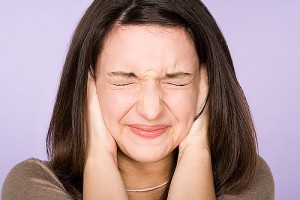 Now and then a patient will come in with complaints of a nerve-wracking, constant ringing or other sounds in their ears. One patient even thought he had gotten an insect in his ear that was buzzing and causing him a lot of anxiety. No, nothing like that! That buzzing sound he was hearing is called tinnitus (pronounced tin-ah-tus) and affects more than 12 million Americans a year. To prevent and treat it, I’d like to tell you more about the origins of tinnitus.
Now and then a patient will come in with complaints of a nerve-wracking, constant ringing or other sounds in their ears. One patient even thought he had gotten an insect in his ear that was buzzing and causing him a lot of anxiety. No, nothing like that! That buzzing sound he was hearing is called tinnitus (pronounced tin-ah-tus) and affects more than 12 million Americans a year. To prevent and treat it, I’d like to tell you more about the origins of tinnitus.
Tinnitus – A Nerve Problem
Many people think that tinnitus is a hearing issue. It’s confusing as it causes hearing changes and is often brought on by very loud noise exposure. Actually, tinnitus has its origins in the nervous system, particularly the tiny nerve cells in and around your ear canal. It’s a result of impaired nerve signals in the ear that the brain misinterprets as buzzing, ringing, or whooshing noises. When you hear sound, it’s a result of tiny, very fine hairs inside your ear moving in relation to sound waves conducted by air through the ear canal. These little hairs move in relation to the pressure that these sound waves make.
This pressure then signals the auditory nerve to release a signal to your brain which then interprets this pressure as sound. This is how we perceive everything we hear – voices, music, birds singing, honking car horns, etc. In the case of tinnitus, however, these tiny hairs inside the ear canal have gotten bent, or broken, and they start leaking random electrical impulses to the brain. These random impulses most often get interpreted by the brain as buzzing and ringing sounds, or sometimes very high pitched tones.
Though tinnitus can affect anyone at any age for many reasons, it occurs most often in over-age- 60 white males, and is often associated with post-traumatic stress disorder, especially where loud noises like firearms were involved. In fact, tinnitus is the #1 complaint of soldiers returning from military service at battle fronts. Other factors associated with tinnitus can include problems with sleeping, concentration, memory, depression and anxiety. However, I believe most of these other factors are likely related to the insomnia that often results from tinnitus.
What Causes Tinnitus?
There are many things which can damage the delicate nerve cells in the ear canal and result in tinnitus. They can include the following:
- Age-related hearing loss (presbycusis). This can happen in people starting around age 60. I feel that this cause is primarily related to nutritional deficiencies in B12 and minerals like zinc and magnesium.
- Loud noise exposure: Exposure to loud noises through occupation such as airplane technical ground crews, construction workers, landscaping crews, musicians or recreation (concerts, loud headphones) can cause or aggravate tinnitus.
- Blocked ear canals: Earwax buildup deep in the ear canal can shift around and cause different sounds. Inflammation, itching and swelling can also result in sound distortion.
- Otosclerosis: Hardening of the bones of the ear. This causes abnormal bone growths inside the ear canal and affects the way air/sound is conducted through the canal.
- Trauma: Getting hit in the ear, or side of the head, or closed/open head injuries can cause nerve damage and compression of tiny vascular structures resulting in tinnitus.
- Meniere’s, Lyme disease, fibromyalgia, allergies: Inflammation inside the ear canal.
- Stress/depression: Antidepressant medications can aggravate tinnitus.
- TMJ: Jaw bone joint disorders may irritate the nerves around the ears.
- Diabetes, thyroid: Nutritional imbalances from these conditions can aggravate tinnitus.
- Acoustic nerve tumors: (Vestibular schwannomas) Tumors that form around the inner ear can affect hearing and balance. Tinnitus from tumors can be a high pitched sound.
- Medications: Antibiotics, cancer drugs, antidepressants, diabetic drugs (see sidebar article), diuretics, quinine, aspirin usage for prolonged periods, or in high doses, can result in tinnitus, or hearing loss. Tinnitus often stops when offending drugs are stopped.
What Can You Do About Tinnitus?
Tinnitus is usually diagnosed at your doctor’s office with a series of questions, hearing and jaw movement tests, and perhaps imaging tests like a CT or MRI to rule out any tumors. However, I also recommend checking B12 levels as well. Research out of Israel’s Institute of Noise Hazards had shown that vitamin B12 deficiencies were present in 47% of study participants with tinnitus. B12 deficiencies are also common in people over age 50 as the ability to absorb it lessens with age. In fact, supplementing with B12 may be enough to reverse some deficiency-related tinnitus. Other treatments might include:
- Retraining therapy: Learn ways to cope with the disorder. Includes transcranial magnetic stimulation (TMS) to reduce tinnitus loudness over time.
- Anti-inflammatories: Omega-3 fish oils, quercetin, Vitamin D3, magnesium. A short course of ibuprofen may also help. Gingko biloba helps increase blood circulation to nourish ear nerve cells.
- Surgery. Bone growths or acoustic neuromas may need to be surgically removed. Low level laser therapy (LLLT) can stimulate ear nerve cells to heal themselves.
Although tinnitus is a frustrating condition that can create anxiety and distress, determining it’s cause often results in effective treatment of it. See your doctor if ear noises are a concern for you. In Part II, I’ll tell you about new treatments for hearing loss and how you can prevent it.
Stay well,
Mark Rosenberg, M.D.
Tinnitus, http://www.mayoclinic.com/health/tinnitus/ds00365/dsection=causes
Insomnia Takes Its Toll on Tinnitus Patients, http://www.sciencedaily.com/releases/2012/04/120419090548.htm
Laser Therapy for Tinnitus, http://www.konftec.com/html/ko_product_tinnitus.htm?gclid=CMPtzda23rACFQYKKgodSxrY2Q
Photo credit:tinnitus-treatment-institute.com
